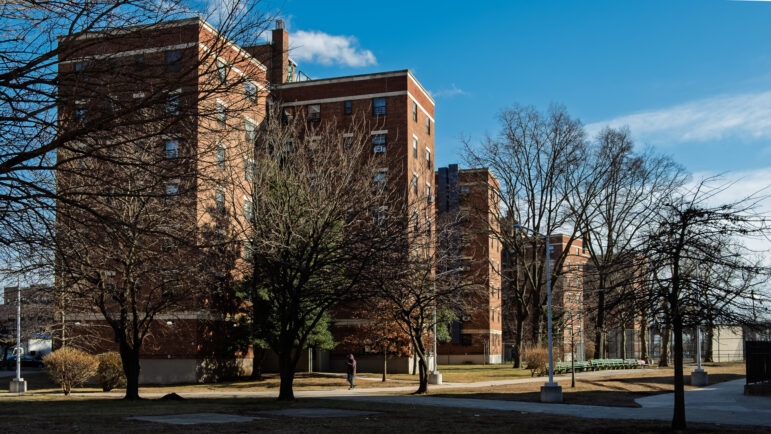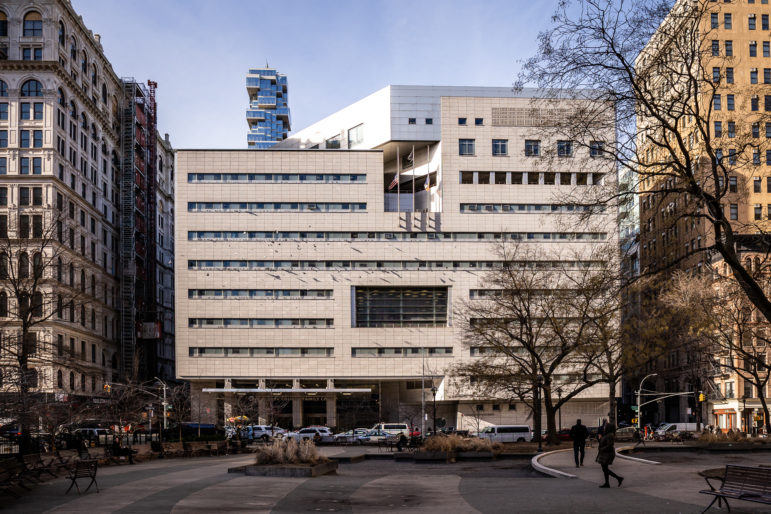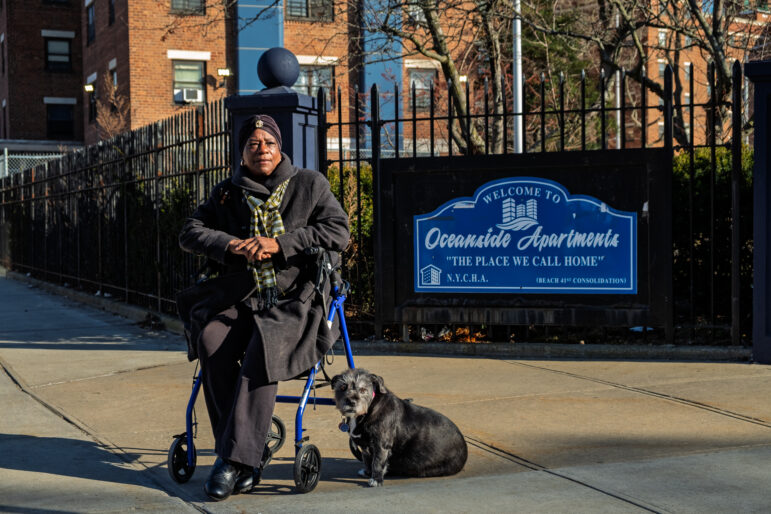It’s 7:30 on a Tuesday night, and another meeting of Pastor Michelle Wade’s “gifting club” begins, as always, with a prayer.
“Lord, protect us from all harm and anoint us with the capability to become wealthy. Amen.” With that, the 20 people assembled here at Bedford-Stuyvesant’s Elim International Fellowship Church take their seats.
Everyone in the mostly female crowd wears the tired expression that comes with being not at all wealthy during this era of go-go IPOs on Wall Street. But tonight, with their kids in tow, they’ve come to this Evangelical church to witness their own financial miracle. They’ve come to hear how–with a little help from Wade, who presides at the front of the room–they can turn their friends, family and business associates into “money, cash money.”
The process is easy. Participants give a $2,000 “gift” to enter the group, and if they can recruit enough new members to come in behind them with the same gift, they’ll receive $16,000 in just a few weeks. After giving $500 back to the club for expenses, the money is theirs to keep. “Now what kind of bank pays you that kind of dividend?” asks Wade, raising her arms above her round body in an exaggerated shrug. “What kind of CD matures that quickly?
“We are all increasing the circle of money and friends,” she says. “This is God’s work.”
If “God’s work” sounds like a pyramid scheme, that’s because fundamentally, it is. To make a profit, club members must pull in an ever-larger number of new investors to pass their cash up the pyramid. When that pool of recruits dries up, the club will have to collapse, and the latest investors will find that the cash they gave to a stranger won’t be coming back.
It’s an ancient financial gimmick, borrowwing from Peter to pay an 800 percent return on Paul’s investment. Such “Ponzi schemes” are illegal in most states, including New York. Yet gifting clubs are thriving. Last year, a group called Amigos Associates Social Club tore through New Jersey, drawing in more than 4,000 people before authorities shut it down in September.
Since then, devoted Amigos members have taken gifting underground, resurfacing with splinter groups like Wade’s. Organizers claim that gifting clubs have now taken root in all five boroughs, Long Island, Connecticut and Virginia.
Wade tells participants they have Bishop Wilbert McKinley to thank for their gifting club. McKinley is head pastor at Elim, a thriving congregation in a trio of well-kept buildings on Madison Street. McKinley reportedly brought gifting to Elim after participating in a similar club and using his winnings to buy supplies for the church.
Wade and McKinley both refuse to discuss the club, its finances, or its connection to the church. The amount of money flowing through the club is sizable–each time a recruiter cashes out, he or she gives $500 back to the club for “expenses.” Ten rounds would produce $127,500.
Meetings are never publicized, and admission is by invitation only. The goal, according to organizers, is to “create a strong economic base for members and their communities.”
Participants, too, insist that gifting is no scam but a cooperative effort to lift people out of financial limbo. Your $2,000 doesn’t go to Merrill Lynch, they point out, but straight back into the community, where a neighbor or friend will use it to buy a home, start a business or send their kids to college. In that sense, Pastor Wade’s gifting club is a deeply flawed but effective grassroots lending network, helping at least some of its members help themselves.
One member is counting on Wade’s payoff to save his stalled career. Once an adjunct lecturer at Queens College, he was just six credits shy of his master’s degree in political science when insolvency forced him to quit in 1991. Now he supports his two children with a job at a foster care agency, work he describes as stressful and depressing. An extra $16,000 could mean everything. “It would certainly help me pay off my student loans,” he says.
For Wade, if gifting can help people like him get their lives on track, it’s nothing less than a step toward racial justice. “When black folks realized they didn’t have to sit at the back of the bus, they started standing up,” she explained at a recent meeting. “That’s what we’re talking about here.”
_______
And so the clubs persist, simply because participants, many of whom live from paycheck to paycheck, desperately need the money. At a time when huge fortunes are being built on nothing but the uncertain promise of companies’ future earnings, gifting doesn’t sound like such an outlandish gamble.
Making $16,000 is pretty easy. All an investor needs to do is find two friends willing to join a pyramid, or “ship,” of 15 people: eight at the bottom, four and two in the middle rungs and a “team captain” on top. Those who can’t come up with a $2,000 entry gift can join $500 or $100 ships.
Inevitably, though, this magical process has its limitations. Just 10 rounds would put $16,000 in the hands of 255 people, but it would require the participation of over 2,000 others. Twenty rounds would call on most of Brooklyn’s 2.3 million residents, and 32 would involve billions more than are currently alive on Earth. None of this dissuades gifting club participants, who say their enterprise will never collapse because winners must reinvest $2,000 of their take after each round. While economists say this recycling strategy only postpones collapse, members appear convinced they will prevail.
“How can you run out of people?” asks club member Dennis McNeil. “Everybody knows somebody. It’s called networking: talking to total strangers and showing them that this can help their lives.” And McNeil has an enticing sales pitch. Last year, he won $16,000 from Amigos, a considerable boost for a former UPS driver who now makes less than $30,000 a year as a foster care caseworker. With his next payout, McNeil hopes to move his family from the Bronx to Westchester or Long Island.
McNeil was one of hundreds to win big with Amigos Associates, which was, before the police stepped in, the mother of all gifting clubs. Meetings were held in the Garden State Exhibition Center, where on a single night last June more than 1,048 people gifted a total of $2,096,000 to 131 team captains. Amigos founder Linda K. Shepard, a church musician and music store owner, publicized the events and reportedly invited law enforcement agents to attend.
Shepard assured the crowds that everything was legal because gifts under $10,000 are exempt from IRS scrutiny. But the state Division of Consumer Affairs didn’t buy it. A judge fined Amigos $200,000 and barred it from doing business in New Jersey.
The court, however, did not find Shepard herself liable for any damages. After a year’s work, she had kept only $40,000, diverting thousands of dollars to soup kitchens, musical groups, a credit counseling program and a relief effort for the flood-devastated town of Bound Brook. According to judge and prosecutor alike, Shepard walked a fine line between charity and fraud but never intended to do any harm. “She’s just an honest, God-fearing woman who was trying to do something good,” says Mark S. Herr, director of the New Jersey State Division of Consumer Affairs. “She truly believed her gifting system was going to help people.”
For better or worse, say church leaders in the neighborhood, these kinds of arrangements have long been part of the Bed-Stuy economy. “These things resurface every five years or so,” says Colvin Grannum, the director of the Bridge Street Local Development Corporation who, for a brief period during the 1980s, fell prey to a scheme then called the “airplane game.”
“There was almost a religious fervor to it,” Grannum recalls. “They were running them out of church halls and people were bringing in their mothers and fathers. I can tell you, no one was trying to screw anybody. I think they just didn’t understand what they were doing.”
Matthew Blanchard is a Brooklyn-based freelance writer.








